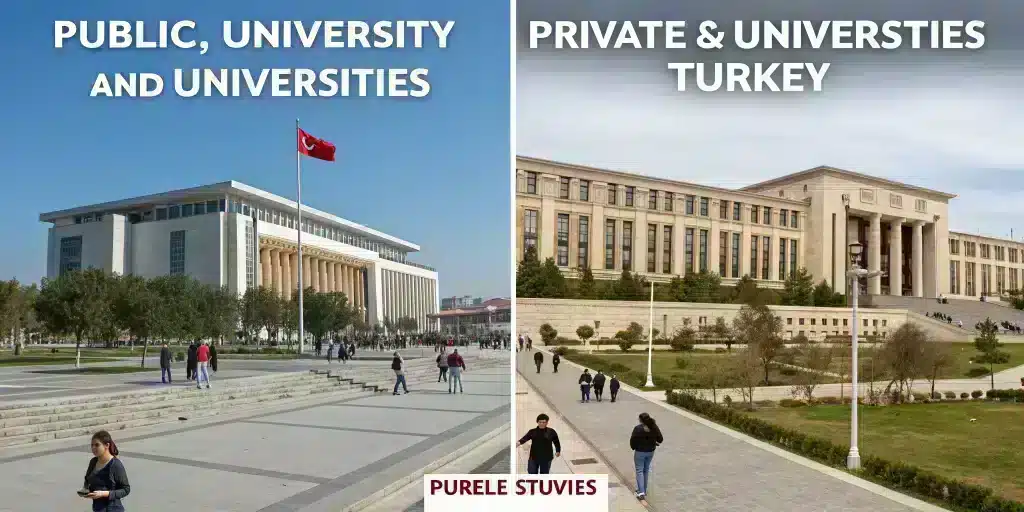Public vs. Private Universities for Undergraduate Studies in Turkiye: Pros & Cons
Public Universities
Pros
- Lower Tuition Costs: Public universities in Turkiye have significantly lower or symbolic tuition fees compared to their private counterparts, making them accessible to a broader group of students, particularly those seeking affordable education. Institutions like Aydin University exemplify this affordability.
- Global Reputation & Research: These universities often rank higher in global academic standings due to extensive research activity and a legacy of scientific contributions. Notable public universities like Medipol University boast international recognition and have a robust reputation in various fields.
- Research Opportunities: Public universities provide substantial opportunities for research and participation in scientific projects. Institutions like Uskudar University enhance these prospects with advanced infrastructure and laboratories.
- Widespread Availability: With 131 public universities distributed across all Turkiye’s provinces, students can often find an institution nearby, ensuring accessibility. This is particularly advantageous for students looking for a specific geographical experience.
Cons
- Competitive Admission: Admission requirements are stricter for public universities, often demanding higher academic scores and passing entrance exams such as YÖS or SAT. This makes acceptance more competitive—particularly in popular fields like medicine at Galata University.
- Language Barrier: The primary language of instruction at many public universities is Turkish. While a few programs are offered in English, this limit can affect international students who do not speak the language.
- Larger Class Sizes: Public universities typically have larger student populations, which may result in less individual attention from professors compared to smaller private institutions. This can be a critical factor for students who prefer a more personalized learning environment.
- Administrative Rigidity: Students at public universities may have less flexibility in choosing programs, courses, or the language of instruction, potentially inhibiting their educational experience.
Private Universities
Pros
- Easier Admission: Admission requirements tend to be more flexible at private universities, often not requiring entrance exams, making it easier for students to gain acceptance. Istinye University is an example of an institution with accessible entry points for prospective students.
- English-Language Programs: Many private universities offer a wide variety of programs taught in English, catering specifically to international students. This is especially advantageous for those seeking to study in a familiar language.
- Modern Facilities & Curricula: Private universities often invest heavily in modern educational technologies and continuously update their curricula to align with global standards. For instance, Antalya Bilim University emphasizes innovation and contemporary educational practices.
- Smaller Class Sizes: With lower student-to-faculty ratios, private institutions allow for more direct interaction between students and professors, which can enhance the learning experience.
- Choice & Comfort: Students have greater flexibility when selecting their preferred location, program, and medium of instruction (e.g., English). This flexibility reduces administrative burdens that can exist in public universities.
Cons
- Higher Costs: Tuition fees at private universities are substantially higher, posing a significant barrier for students without sufficient financial resources. This factor necessitates careful financial planning and consideration.
- Variable Academic Reputation: While some private universities are highly ranked, public universities generally carry more weight in international recognition, particularly concerning research and academic reputation.
- Less Emphasis on Research: Private universities might focus primarily on teaching and student services, often providing fewer opportunities for cutting-edge research compared to public universities.
Comparison Table
| Feature | Public Universities | Private Universities |
|---|---|---|
| Tuition Fees | Low/Symbolic | High |
| Admission Criteria | Competitive, Exam-Based | Flexible, Less Competitive |
| Language of Instruction | Mostly Turkish, Few in English | Many Programs in English |
| Class Size | Larger | Smaller |
| Academic Reputation | Generally Higher | Variable, Some Highly Ranked |
| Research Opportunities | Extensive | Moderate |
| Flexibility | Limited | Greater (choice of program/language) |
| Student Services | Standard | Often Enhanced |
How Should International Students Choose?
Public Universities: If affordability and research reputation are top priorities, and if students are prepared to meet competitive admission and language requirements, public universities might be the ideal choice. Institutions like Beykent University and Ostim University are notable for their research contributions.
Private Universities: If ease of admission, instruction in English, and personalized learning environments are more critical, and if budget constraints are less of a concern, private universities may suit many students’ needs. For instance, Halic University provides a conducive environment for such learners.
Conclusion
In conclusion, both public and private universities in Turkiye provide strong academic environments tailored for diverse student needs. Your choice should depend on personal academic goals, language skills, budget, and preferences regarding campus culture and learning style. Whether you ultimately choose a distinguished public institution like Bilgi University or a dynamic private one such as Aydin University, Turkiye offers numerous educational opportunities that can help shape a successful career.
Take the Next Step with Study in Turkiye
Explore the numerous educational opportunities available for you in Turkiye. We are here to guide you every step of the way!

